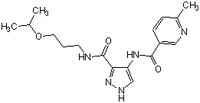361563 Sigma-AldrichGSK-3 Inhibitor XXII, Compound A - Calbiochem
Recommended Products
Overview
| Replacement Information |
|---|
Key Spec Table
| Empirical Formula |
|---|
| C₁₇H₂₃N₅O₃ |
| References | |
|---|---|
| References | Uno. Y., et al. 2009. Brain Res. 1296, 148. |
| Product Information | |
|---|---|
| Form | Green-grey solid |
| Hill Formula | C₁₇H₂₃N₅O₃ |
| Chemical formula | C₁₇H₂₃N₅O₃ |
| Structure formula Image | |
| Quality Level | MQ100 |
| Applications |
|---|
| Biological Information | |
|---|---|
| Purity | ≥95% by HPLC |
| Physicochemical Information |
|---|
| Dimensions |
|---|
| Materials Information |
|---|
| Toxicological Information |
|---|
| Safety Information according to GHS |
|---|
| Safety Information |
|---|
| Product Usage Statements |
|---|
| Packaging Information | |
|---|---|
| Packaged under inert gas | Packaged under inert gas |
| Transport Information |
|---|
| Supplemental Information |
|---|
| Specifications |
|---|
| Global Trade Item Number | |
|---|---|
| Catalogue Number | GTIN |
| 361563 | 0 |
Documentation
GSK-3 Inhibitor XXII, Compound A - Calbiochem SDS
| Title |
|---|
GSK-3 Inhibitor XXII, Compound A - Calbiochem Certificates of Analysis
| Title | Lot Number |
|---|---|
| 361563 |
References
| Reference overview |
|---|
| Uno. Y., et al. 2009. Brain Res. 1296, 148. |







